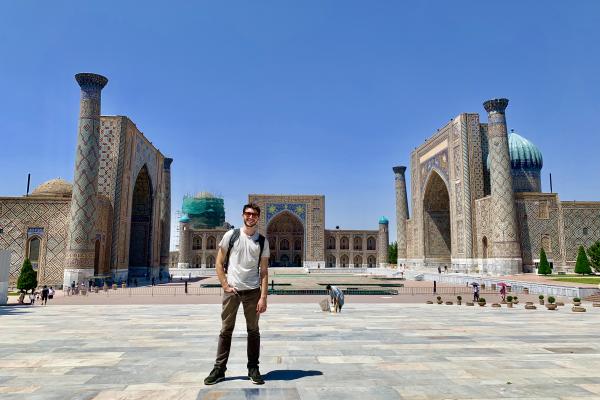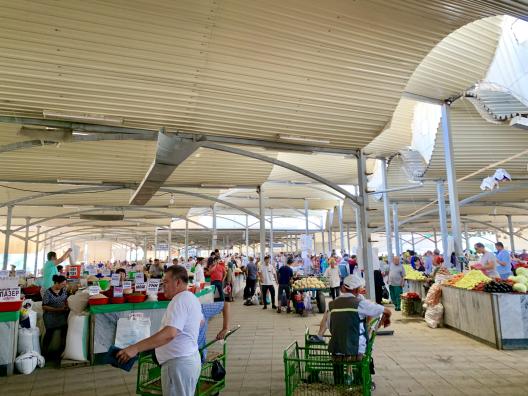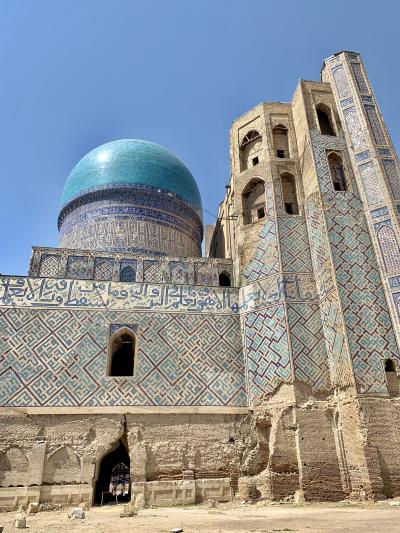From the FLAS Fellows: Kyle Erickson

By: Kyle Erickson (CSEEES MA Student, 2022 Summer and 2022-23 Academic Year FLAS Recipient for Uzbek)
Before making our way to Uzbekistan for two months, my wife and I were celebrating our honeymoon backpacking around India. Before boarding the plane in New Delhi for a three-hour flight to Tashkent, I told my wife that going to Central Asia felt like “going home”. This was our third long-term trip to Central Asia on a FLAS fellowship (we had met in Kyrgyzstan), and this would be our second time visiting Uzbekistan.
Because of Uzbekistan’s historical ties and geographic proximity to Russia, many people (including myself, at first) assume that the Uzbek language must have some connection to Russian. However, Uzbek is a Turkic language, which makes it much closer to Turkish, Kazakh, or Uighur than it is to Russian. Because of the history of Islamic conquests, Mongol invasions, and Persian dominance over the region, Uzbek has an expansive vocabulary with words that have origins from all over the ancient world. Despite this, besides relatively modern words like airplane and telephone, Uzbek bears almost no resemblance to the Slavic languages.
Upon our arrival in Tashkent, we noticed how cool the weather was. “Cool” is not a typical way people describe summers in Uzbekistan—but coming from Delhi, where the daily highs were around 115°, 98° felt quite comfortable. On our first day, June 17th, it actually rained in Tashkent—I remember that day because that was the last time I’d see rain for two months.

Tashkent is no typical post-Soviet Central Asian capital. The city, once a relatively minor hub on the Silk Road centuries ago, was tragically flattened by an earthquake in 1966. The Soviet government rebuilt the city over the next few decades—crucially, with an underground metro system. This is why, compared to other Central Asian capitals like Bishkek or Astana, Tashkent is exceedingly easy to travel around. Also, in the blistering heat of the day, the metro provides some measure of relief.
Another thing that sets Tashkent apart from other post-Soviet Central Asian cities is that they have, for the most part, held on to their native tongue after seven decades of Soviet rule. In Bishkek and Astana most residents don’t even know Kyrgyz or Kazakh, as Russian is still the de facto language. In Tashkent, the people speak Uzbek, and they’re proud of it. The only people who would initiate conversations in Russian with me would be Russian and Ukrainian refugees who presumed I was there for the same unfortunate reason they were.
In the aftermath of both the American withdrawal from Afghanistan and Russia’s war in Ukraine, tens of thousands of refugees moved to Uzbekistan to escape conflicts or economic ruin. Landlords, noting the rise in demand and the typically higher incomes of the refugees, have raised the rents for apartments quite a bit—an apartment that was going for $300 per month in January was going for $500 per month by June.

Life is changing in Uzbekistan. In contrast to the repressive tenure of Uzbekistan’s first president, Uzbekistan’s second president, Shavkat Mirziyoyev, has enacted some reforms aimed at liberalizing the country and opening up for foreign investment. Instead of the Soviet-era Ladas you would’ve seen driving around in the early 2000s, almost everyone in Tashkent drives a newer-model Chevrolet. New skyscrapers, opulent conference centers, and new rail-lines are all being built in the hopes of making Tashkent a global city.
By the end of my time in Uzbekistan, I had learned quite a bit not only about the country, but its language. One of the benefits of taking on a rarely-learned language is the amount of hands-on instruction you get—as the only person in my class at Tashkent State Pedagogical University, I spent four to seven hours per day speaking only Uzbek with my instructors. While certainly rigorous and frustrating at times, I am proud to say that I made genuine progress in my Uzbek language journey. Beyond that, anyone who has travelled throughout the post-Soviet world knows that the best conversation partners are usually taxi drivers—I learned a lot of vocabulary from them too.
In our cab ride to the airport, the driver and I were talking about how much has changed in Uzbekistan over the past few years. I wonder how much it’ll have changed by the time I return someday.
